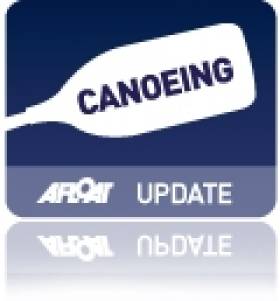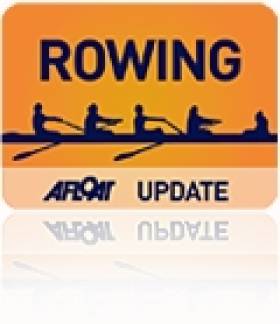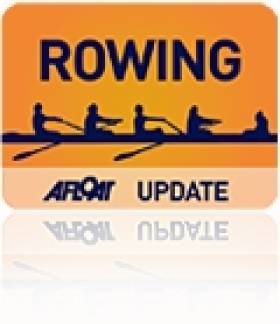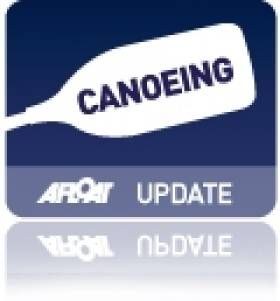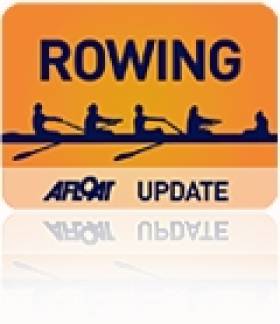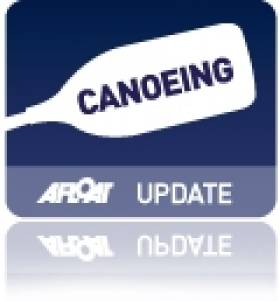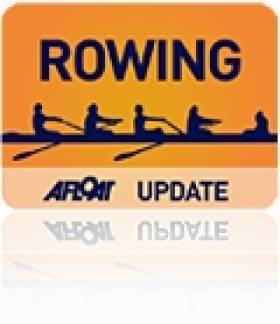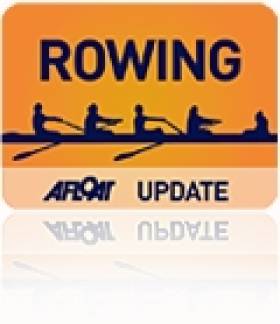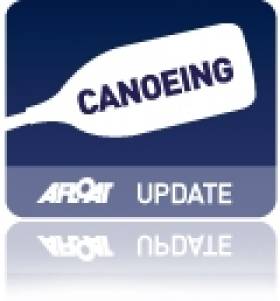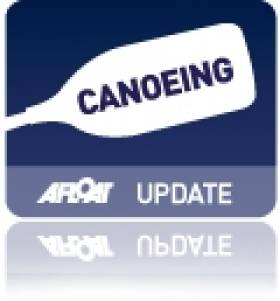Displaying items by tag: Olympic Games,
# CANOEING: Ireland had a terrific start in the Olympic Canoe Sprint events at Eton Dorney this morning. Andrzej Jezierski was not happy with his start in the C1 200 metres but covered the second 100 metres very well to to finish second and qualify comfortably for the semi-finals.
Mathieu Goubel of France won the heat, but the big surprise was that Valentin Demyanenko, the reigning world champion, did not qualify. The man who represents Azerbaijan finished seventh and last.
Olympic Games
Canoe Sprint – Eton Dorney – C1 200m – Heat One (Six to Semi-Finals): 1 France (M Goubel) 41.248, 2 Ireland (A Jezierski) +0.156, 3 Japan (N Sakamoto) +0.280, 4 Canada (J McCoombs) 0.494, 5 Brazil (R Oliveira) +0.968, 6 Australia (S Marczak) +1.597; 7 Azerbaijan (V Demyanenko) +2.946.
Tearful Campbell Finally Lands His Olympic Medal
# ROWING: Alan Campbell took his first Olympic medal in three attempts at Eton Dorney today. The 29-year-old Coleraine man, who competes for Britain, took bronze by fighting off Sweden’s Lassi Karonen in a race which brought Mahe Drysdale gold. The New Zealander was a decisive winner in his battle at the head of the field against Ondrej Synek of the Czech Republic.
Campbell had been part of the Britain quadruple scull in 2004 which finished 12th. He finished fifth in the single sculls in 2008. A knee infection had left him weakened in the run-up to that Games and he might not have competed at all. When he mounted the podium for the presentation today he was in tears.
# ROWING: Sanita Puspure had a great start and battled hard in the toughest quarter-final of the single scull at the Olympic Regatta. However, a fourth-place finish left her one place outside the mix for the A/B semi-finals.
Puspure actually led off the start. Mirka Knapkova, the reigning World Champion, had taken over by 500 metres, but Puspure was tucked into third, with Frida Svensson (the World Champion of 2010) in second. Genevra Stone could only manage fifth at this stage, but the American was outstanding through the rest of the race: she pushed Puspure into fourth by halfway, and by the finish she had taken over second from Svensson. The Swede held off Puspure’s late efforts to take third.
Interestingly, the Olympic Qualification Regatta in May – the last chance to get to the Games – provided three A/B Semi-Finalists. Kim Crow of Australia and Fie Udby Erichsen of Denmark actually won their quarter-finals, and Stone finished second in hers with Puspure finishing in a time which would have put her in the top three in each of the other quarter-finals.
The Ireland athlete is now set to compete in the C/D Semi-Finals on Thursday.
Olympic Games – Rowing – Women’s Single Sculls Quarter-Final Two (Three to A/B Semi-Finals; rest to C/D Semi-Finals): 1 Czech Republic (M Knapkova) 7:35.35, 2 United States (G Stone) 7:39.67, 3 Sweden (F Svensson) 7:40.64; 4 Ireland (S Puspure) 7:44.19, 5 Cuba (Y Cobas Garcia) 7:56.89, 6 El Salvador (C Vargas Palomo) 8:07.67.
# CANOEING: A very good second run in the heats, when she was under real pressure to perform, gave Ireland’s Hannah Craig a place in the semi-finals of the Olympic Games today. Eoin Rheinisch had qualified in the canoe slalom in the men's K1 on Sunday.
The course at Lee Valley proved extremely testing for the competitors in the women’s K1 canoe slalom. The top 15 of 21 qualified, and Craig clocked 117.07 seconds for her first run, which placed her 14th for the first run. This included eight seconds in penalties. The time put her into second place at this stage behind Luuka Jones of New Zealand who clocked 109.23. However, the top competitors then pushed through, with Maialen Chorraut of Spain setting an outstanding time of 98.75 seconds. But some of the top canoeists in the world, including Jessica Fox of Australia and Corinna Kuhnle of Austria did poorly on the first run and lay behind Craig, with every chance they would push Craig out with their second runs: the Irishwoman knew she had to improve to be sure of making that top 15.
Her second run looked better from the start. She moved sweetly all the way to the really difficult gate 12, on which she lost some time, but she found her way again and only a clip on gate 19, bringing her a two-second penalty, tainted a fine round of 108.99 seconds.
Fox and Kuhnle did indeed set excellent times in their second runs, ensuring that even the better second run only secured 14th place for Craig. Jones took the 15th spot.
Olympic Games – Canoe Slalom – Women’s K1 Heats (First 15 qualify for semi-final): 1 Spain (M Chorraut) 98.75 (1st run); 14 H Craig 108.99 (2nd run).
# ROWING: Ireland’s Sanita Puspure faces a tough task tomorrow (Tuesday) if she is to attain her aim of qualifying for the Olympic semi-finals in the single sculls. In an ironic twist, she will most probably have to finish ahead of Genevra (Gevvie) Stone of the United States in their quarter-final to qualify. Three go through, and Mirka Knapkova of the Czech Republic and Frida Svensson of Sweden will be hot favourites to take the first two places, most likely leaving Stone and Puspure to fight it out for the third qualification place. In the Olympic Qualification regatta in May, Puspure targeted finishing ahead of Stone, but saw the American produce a fine performance to finish third. Puspure then showed great determination to take out Iva Obradovic of Serbia to take the fourth qualification place.
At Dorney Lake today, the New Zealand four, which features Irishman Sean O’Neill, finished fourth in their heat and will need to compete in the repechage to go further. The dominant Australian crew won the heat and set a stunning time of five minutes 47.06 seconds. This was a new Olympic Best time. Britain were also dominant in their race, and the United States won the third heat.
Olympic Games – Rowing, Dorney Lake, Day Three (Irish Interest)
Men’s Four – Heats (First Three Directly to A/B Semi-Finals; rest to Repechage) – Heat One: 1 Australia 5:47.06, 2 Germany 5:49.84, 3 Canada 5:50.78; 4 New Zealand 5:51.84, 5 Serbia 5:53.35.
# CANOEING; Eoin Rheinisch qualified for the semi-finals of the Olympic Games with a fine first run in the K1 canoe slalom heats. Fifteen off the 22 competitors went through, and Rheinisch will go off 12th on Wednesday.
His first run of 89.97 placed him sixth – though team manager Karl Dunne had to launch an immediate objection to remove a penalty of two seconds given wrongly for a supposed touch on gate 19. Rheinisch could not improve on that in the second run – he had another penalty-free paddle, but clocked 90.72 seconds. His first run was enough to see him through in heats won by Hannes Aigner of Germany, who clocked a superb 83.49 seconds in his second run on a technically difficult course.
Benjamin Boukpeti, the man who went off last in the Olympics in Beijing and pushed Rheinisch out of bronze medal position, qualified in 14th, and Richard Hounslow of Britain had to produce a good run under pressure to qualify in 11th. Among those eliminated were Scott Parsons of the United States and Warwick Draper of Australia.
Olympic Games – Canoe Slalom: Men’s K1 Heats (Irish interest): 1 Germany (H Aigner; 2nd run) 83.49; 12 Ireland (E Rheinisch) 89.97.
# ROWING: Sanita Puspure qualified for the quarter-finals of the women’s single scull at the Olympic Games today. The 30-year-old needed to finish in the top four to qualify and she finished in a comfortable third place, behind impressive winner Emma Twigg of New Zealand and Donata Vistartaite of Lithuania.
Coleraine men Richard and Peter Chambers had an excellent start to their Olympic campaign in the British lightweight four. They were led by Australia until the final 500 metres, but a big push by Britain made all the difference. They passed the Australians and moved away to win well.
Alan Campbell also won his heat of the single scull. Ondrej Synek of the Czech Republic and Mahe Drysdale of New Zealand were also impressive winners.
Olympic Games, London
Women’s Single Scull – Heats (First Four Directly through to Quarter-Finals; rest to repechages).
Qualifiers – Heat One: 1 New Zealand (E Twigg) 7:40.24, 2 Lithuania (D Vistartaite) 7:43.07, 3 Ireland (S Puspure) 7:49.35, 4 Brazil (K da Costa) 8:07.75. Heat Two: 1 Australia (K Crow) 7:41.18, 2 Azerbaijan (N Mustafayeva) 7:46.01, 3 Zimbabwe (M Thornycroft) 7:47.10, 4 Cuba (Y Cobas) 7:48.58. Heat Three: 1 Czech Republic (M Knapkova) 7:24.17, 2 Denmark (FU Erichsen) 7:29.37, 3 Germany (ML Draeger) 7:44.23, 4 Thailand (PN Rodenburg) 7:52.62. Heat Four: 1 China (X Zhang) 7:21.49, 2 Sweden (F Svensson) 7:32.61, 3 Paraguay (G Mosqueira Benitez) 7:52.07, 4 Japan (H Sakakibara) 7:52.98. Heat Five: 1 Belarus (E Karsten) 7:30.31, 2 Russia (J Levina) 7:32.06, 3 United States (G Stone) 7:33.68, 4 Mexico (D Oakley Gonzalez) 8:00.17.
# ROWING: Ireland's sole rowing Olympian, Sanita Puspure, has a reasonably good draw in Saturday's first heat of the single scull (1.30). She is set to compete in lane six, with lane five taken by Emma Twigg of New Zealand, a bronze medallist in the last two World Championships. The woman who finished ninth at the 2011 World Championships, Donata Vistartaite of Lithuania, is in lane two, while Iran (lane one), Argentina (three) and Brazil (four) compete the draw. Four of the six will go directly into the Quarter-Finals on Tuesday.
# CANOEING: Andrzej Jezierski finished fifth in the A Final of the C1 200 class at the Canoe Sprint European Championships in Zagreb in Croatia today. The Poznan native, who lives in Co Cork, has reportedly been suffering from a shoulder niggle, but this placing continues an improving run since he qualified for London 2012 in May. He finished 14th in the World Cup in Poznan and seventh in the World Cup in Duisburg. “We are very pleased with today’s result,” said Karl Dunne of the Irish Canoe Union. “It’s good progress.”
Craig Books Her Place in Canoe Slalom at London 2012
#CANOEING: Hannah Craig is set to represent Ireland at the Olympic Games in London in the K1 racing kayak. The Antrim woman finished 25th at the European Canoe Slalom Championships in Augsburg today, the highest position occupied by a boat from a country not already qualified. Elise Chabbey of Switzerland took the second place on offer by finishing 32nd.
Canoe Slalom European Championships, Augsburg, Day Two
Women
K1 (racing kayak) Heats (1st and 2nd runs): 1 Germany (J Schornberg) 99.26 seconds (2nd run); 25 Ireland (H Craig) 105.69 (2nd run); 32 Switzerland (E Chabbey) 109.32 (2nd run) 47 Ireland (H Barnes) 112.14 (1st run); 40 Ireland (A Conlon) 120.18 (1st run).



























